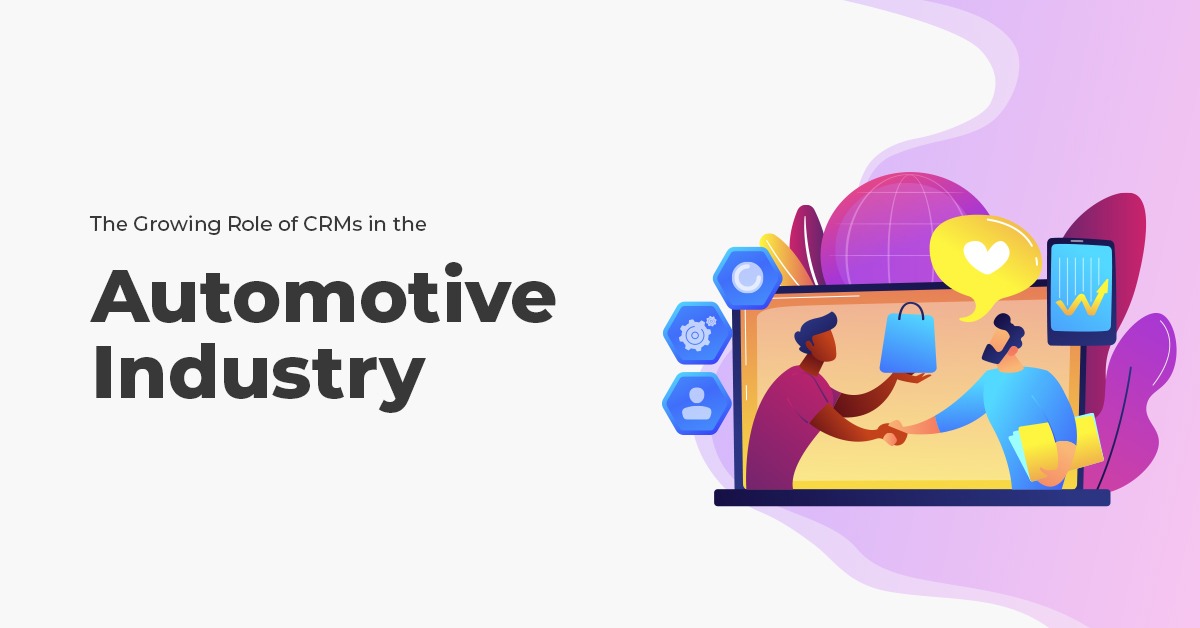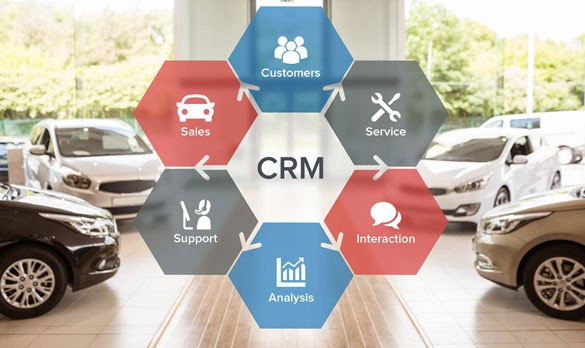The Growing Role of CRMs in the Automotive Industry

There has been an observed rise in the adoption of CRMs in the automotive industry. Many companies claim that the technology has helped them track leads smartly and provide them service based on car buying preference.
How is this technology is shaking one of the world’s biggest industries? What will a company miss out on if it refuses to adopt this technology? Read on to find out.
What is CRM?
Before anything else, let’s discuss what a CRM is and why it’s important for many businesses, regardless of the industry.
Customer Relationship Management (CRM) is, first of all, a business approach. It aims to establish profitable relationships over the long term by ensuring customer satisfaction right from the start of the buyer’s journey. So by ensuring that the company delivers excellent service when a lead is captured, the company is guaranteed to have a higher success in converting that lead into a customer.
But what is excellent service here? Most CRM approaches deal with customer data that refer to the customer’s identified and unidentified needs and preferences. So, here, it is important for the company to have a system that allows it to collect customer data. And by referring to the data, the company is able to deliver a personalized service that directly addresses the needs and preferences of the customer, providing impact and value to that customer.
In the end, this establishes customer loyalty. The customer is satisfied with the company’s service and is therefore highly likely to return and purchase from the company again. Moreover, the said customer may also refer the company to their friends or family, acting as the brand’s ambassador, albeit unofficially. Overall, this leads to an increase in sales in the company and helps it drive growth.
What is an automotive CRM?
Automotive CRMs are software designed for companies in the automotive industry to implement best practices in customer relationship management. This type of software has features and tools that are intended to help automotive companies to gain more sales and deliver faster and more personalized service to leads and customers.
The rate of adoption of CRM in the automotive industry has grown exponentially in the past few years. Companies claim that automotive CRMs have been crucial to their success. The technology has led them to create intelligent lead distribution systems that allow sales managers to cater to prospective customers based on their car buying needs and preferences. It also allowed them to implement targeted lead tracking and nurturing processes to assist customers in scheduling appointments and negotiating with them.

https://miro.medium.com/max/585/1*SvnHw6Oh28d-a3onJwrIyA.jpeg
What is the role of CRM in the automobile industry?
CRMs improve automotive companies’ processes in the following:
Improving Customer Relationships
Driving Sales Growth
Providing Customer Support
Delivering Better Service
Providing Personalized Interaction
Analyzing Trends and Customer Feedback
Let’s discuss them below:
1.Improving Customer Relationships
CRMs, in general, are designed and developed to help companies improve their business relationships with customers. This happens first, by ensuring that the service delivered by the company to the customer is targetive and personalized, meaning that each content delivered to the prospective customer is not repetitive and relevant to their needs and preferences.
Second, through the use of tools and features of the CRM, such as automation, the service delivered is faster and smoother as well, compared to services without the technology. CRMs also eliminate or at least reduce the errors that are usually found in manual business processes. Third, automation reduces the workload of the sales team in a company, allowing them to focus on more important aspects of their relationships with prospects and customers that are yet to be automated.
In the end, when the service delivered is:
Personalized and relevant to the customer’s needs and preferences
Faster and smoother because of automation and human error is taken out of the equation
Improved because the sales team is empowered and more focused on the customer’s welfare because the manual, boring tasks are thrown out the window
Customers are more likely to end up satisfied with the company’s service, reducing customer churn out and improving customer loyalty.
2.Driving Sales Growth
It doesn’t take a genius to figure out that when a prospect is satisfied with the service they received right from the start of the buyer’s journey, they are more likely to make a purchase. When they are receiving the right service after they make their first purchase, they are more likely to purchase from the said company again. What’s more, they’re also more likely to advertise the company to friends and family, making it highly likely for them to buy from the said company. All of these drive sales to the company and increasing the overall sales output of the company.
In summary, CRMs are crucial in the following sales and marketing aspects:
- Sales Conversion (Converting Leads Into Customers)
- Repeat Purchases (Customers Buying Again After Their First Purchase)
- Word-of-Mouth Referrals (Customers Promoting Your Business to Friends and Family)
3.Providing Customer Support
When the company has all the necessary data and tools about a customer, they are highly likely to resolve issues and challenges that customers experience as they go through the buyer’s journey (or sales pipelines).
CRMs help companies systematically collect customer data and retrieve this data with ease. This empowers support teams to successfully engage prospects or customers and provide solutions.
4.Delivering Better Service
Having a proper data collection system allows companies to know more about their prospects and customers without repeating transactions. Right from the start, the customer’s essential information is gathered and the information is added to the customer’s records in the database. This can be enriched with the data gathered from the succeeding transactions with the customer.
All of this data will then be used to deliver a service that is straightforward— fixing the problems encountered by the customer immediately or delivering information that the customer needs, at the time— providing impact and meaningful engagement, and ultimately a better service compared to companies that don’t use this system.
5.Providing Personalized Interaction
With a CRM, companies can empower their sales reps to deliver a personalized interaction with customers as if the customer was talking to one salesperson every time they are interacting with the company. This provides the company better flexibility when it comes to customer engagement. And this also eliminates the need for companies to ask customers about their contact details every time they interact with the same customer.
6.Analyzing Trends and Customer Feedback
Customer feedback and behavior can mean a lot to companies. With a CRM, they can gather essential information easily. This information helps companies improve their services, match their services with prospects’ and customers’ styles and preferences, and analyze emerging trends to hijack opportunities.
CRMs can also help users generate insights automatically and display these insights on a dashboard so they can get a quick glimpse of the team or the company’s performance and adjust accordingly.
Start Your Automotive CRM Journey With Us
Looking to enhance your service as an automotive company and impress your customers? Check out how our CRM can help you gain an edge over your competitors. Get started here.
Book a Demo